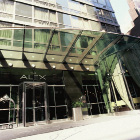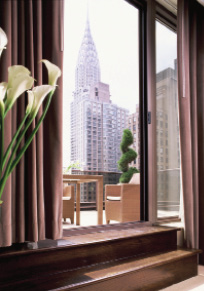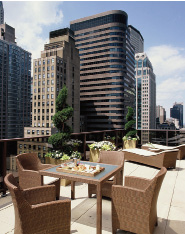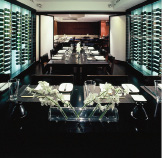- Home
- Media Kit
- Current Issue
- Past Issues
- Ad Specs-Submission
- Ad Print Settings
- Reprints (PDF)
- Photo Specifications (PDF)
- Contact Us

![]()
ONLINE

Individualized Service
Editors’ Note
Mary Lou Pollack assumed her current post in May 2003. Before this, she worked for New Jersey-based Prime Hospitality Corp. for 16 years, eventually becoming Vice President of National Sales. Pollack was the recipient of the Frank W. Berkman Tourism Achievement Award for General Manager of the Year in New York City in 2007, the same year The Alex received the Leaders Club Award of Excellence from The Leading Hotels of the World, Ltd. She is a graduate of Duke University.
Property Brief
Opened in November 2003 in midtown Manhattan, The Alex Hotel (www.thealexhotel.com) features 203 luxurious rooms and suites, each with custom-designed furniture, original artwork, a fully equipped kitchen (in suites), and a host of high-tech amenities, including a DVD player, high speed Internet access, and a flat-screen television in every bedroom, living room, and bathroom. The property, owned by real estate developer Izak Senbahar and hotel developer Simon Elias houses business and fitness centers, as well as Riingo, a Japanese-American restaurant serving the food of renowned chef, Marcus Samuelsson.
When you look at what the hospitality industry has gone through these past 24 months, how challenging has it been for The Alex and what is your outlook for recovery?
In 2010, we saw the resurgence of business from our major corporate customers. So even though the rate was not there, we saw a great deal of travel from the accounts we have.

The Alex Entrance
The beginning of 2009 was a desperate time when people were not traveling. It was the most frightening first and second quarter in most people’s careers.
But business and personal travel has come back and New York City has become the number-one tourist destination in the U.S. Other parts of the country like Las Vegas and Orlando have not been as fortunate.
I expect you will see hotels start to raise their rates for 2011. There was a lot of back and forth in 2010 between corporations who wanted to hold their very low rates for another year or indefinitely and hotels who cannot continue to do business at those prices.

Penthouse View
In late 2010, we are starting to see almost what we saw a year or so after 9/11, when as business came back, hotels raised their prices and customers had to realize they weren’t in the driver’s seat as much as they were at the height of the crisis.
How are you able to cut costs in tough times so the guests don’t see it?
In 2009, we rethought the way we did business. For instance, we started buying and arranging all of our flowers in house, saving about $100,000 a year. We tried very hard to identify and cut things that guests did not seem to appreciate. We didn’t cut things the guests need and expect, like service in the front of the hotel.
As a part of The Leading Hotels of the World, many look at The Alex as a luxury property. How do you define your niche?
From a staffing and service standpoint, we are known for having a great team, a well-trained staff, and all the elements of luxury service.

Penthouse Terrace
Although The Alex has always had a modern, younger design and vibe, we are traditional in terms of our standards.
How much of a focus is the corporate market?
The corporate business is 60 percent of our mix, and of that 60 percent, probably half of it is corporate negotiated. It’s critical to keeping us full and busy; these are also very desirable guests to have.
Even with the business traveler coming back, there are still more short-term bookings than in the past. Is the mentality on bookings different than it used to be?
Yes. We have turned into a two-week lead-time house and city. It’s very scary to be a completely transient house. But that is how people do business today.
Has the restaurant part of this business evolved the way you had hoped and has it been able to draw from the local community?
The restaurant has a wonderful product and the guests love it. The food is New American cuisine with all-natural, organic ingredients. It serves the needs of the hotel guests very well.
The quality of a restaurant always positions a hotel. We have a very fine chef who was selected to cook for President Obama’s first White House State dinner.

Riingo Restaurant
How do you define the role of General Manager today? Is the focus more on business as opposed to just hospitality?
You have to have the hospitality aspect in your personality at all times. A General Manager needs to infuse the entire team with a love of hospitality and the generous giving of individualized service.
However, this is a business. It’s about keeping up with the times, and staying abreast of changes in technology, distribution, branding and merchandising. It is also, and has always been, about the bottom line.
Will there be a role for travel agents in the future?
There are still some 82,000 travel agents out there. Almost 50 perfect of our business comes through the GDS (Global Distribution Systems), which is 100 percent travel-agent driven.
So I believe there is a role for them in the future. There is still a demand for consultative assistance from real travel agents. Travel today is so expensive. Without good advice you could easily waste half of what you’re spending on a trip.•